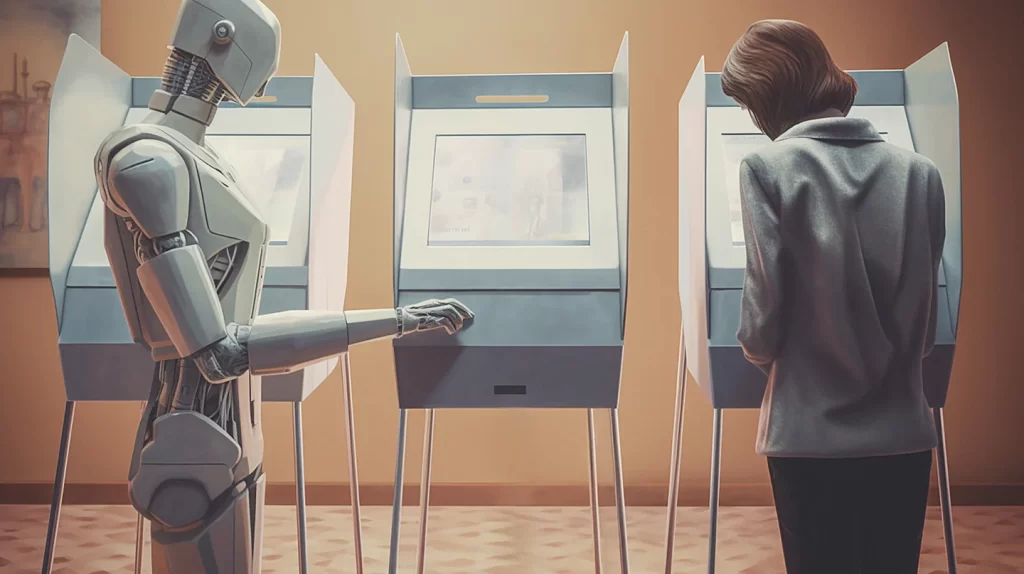Artificial Intelligence in Political Campaigns: Benefits, Risks, and Ethical Considerations

by Amil Imani
Have you ever wondered how Artificial Intelligence (AI) is reshaping the world of politics? The topic is as fascinating as it is potentially concerning. AI influences political campaigns in many ways, from analyzing voter sentiment to tracking campaign costs and conducting opposition research.
AI’s impact on politics is far-reaching. Imagine understanding voter preferences and outreach strategies in real-time, thanks to AI’s ability to analyze social media trends and sentiment. By examining influencers, trends, and public sentiment, campaigns can better tailor their messages to connect with voters. It’s like having a real-time pulse on the electorate.
Not only can AI help campaigns understand voters, but it can also assist in measuring the effectiveness of various campaign activities. AI can track everything from advertising to canvassing and events, providing insights into what’s working and what’s not. Campaigns can make data-driven decisions to optimize their strategies and maximize their impact.
But that’s not all. AI isn’t just about understanding voters; it’s also about understanding the money. It can track campaign spending by identifying discrepancies and patterns in politicians’ spending habits. This is crucial for maintaining transparency and accountability in the political process. AI-powered auditing tools can streamline the financial oversight process, making it more efficient and accurate.
Let’s remember the advantage it gives political parties in opposition research. AI can dig deep into opponents’ voting records and past statements, providing valuable insights to gain a competitive edge.
However, there’s a darker side to AI in politics. Privacy and ethical concerns loom large. For instance, using AI to gather and analyze personal voter data raises serious privacy and data protection issues. We’re talking about your personal information, and the potential for misusing it should not be underestimated.
Moreover, there’s the unsettling prospect of AI making political campaigns more deceptive. AI can be used to create fake images and audio. I am sure you know about deepfakes, which are synthetic media that appear to be real but are actually manipulated. Such powerful methods can be employed to launch misleading campaign ads targeting other candidates. AI can be used to spread disinformation and propaganda. Governments and powerful elites can use AI to standardize, control, or repress political discourse, undermining the fairness and quality of political discourse.
AI algorithms can inadvertently perpetuate existing biases. For instance, if the data used to train the AI is biased, the AI’s outputs can also be unfair. This can lead to unjust targeting of specific demographics or communities. Indeed, it’s a digital battleground where authenticity can be blurred, and the line between fact and fiction becomes hazy.
But then, AI can bring several benefits to political campaigns beyond tracking costs and conducting opposition research. Here are some potential benefits:
Enhancing Communication: AI can improve communication by providing personalized messages to voters. It can analyze the preferences and behaviors of individual voters and tailor the communication accordingly. This can lead to more effective campaigns and better engagement with voters.
Improving Campaign Strategy: AI can analyze large amounts of data to identify trends and patterns that can inform campaign strategy. This can help campaigns anticipate potential challenges and develop effective responses.
Facilitating Transparency: AI can help campaigns maintain transparency by objectively analyzing their activities. This can help campaigns manage their reputation and respond to criticisms effectively.
Generating Political Messaging: AI can generate political messaging based on public discourse, campaign rhetoric, and political reporting. This can help campaigns develop effective messaging strategies and reach a wider audience.
Creating Political Parties: AI could be used to develop political parties with their platforms, attracting human candidates who win elections. This could revolutionize the political landscape by creating new political parties based on AI-generated platforms.
Fundraising: AI is capable of fundraising for political campaigns. It could take a seed investment from a human controlling the AI and invest it to yield a return. It could start a business that generates revenue or political messaging to convince humans to spend their own money on a defined campaign or cause.
It’s intriguing, isn’t it? The world of AI in politics is both a boon and a minefield. It can empower campaigns and voters but also carries risks of manipulation and deception. As we continue to explore the vast landscape of AI in politics, it’s crucial to tread carefully, adhere to ethical guidelines, and protect personal data from unauthorized access.
So, the next time you follow a political campaign, remember that behind the scenes, AI might be at work, shaping the discourse, analyzing voter sentiment, and, in some cases, creating an illusion of reality. How AI and politics interact is a complex and evolving story, and it’s up to all of us to stay informed, vigilant, and engaged in this digital age of politics. The journey is far from over, and the questions are still unfolding. What will we discover next?